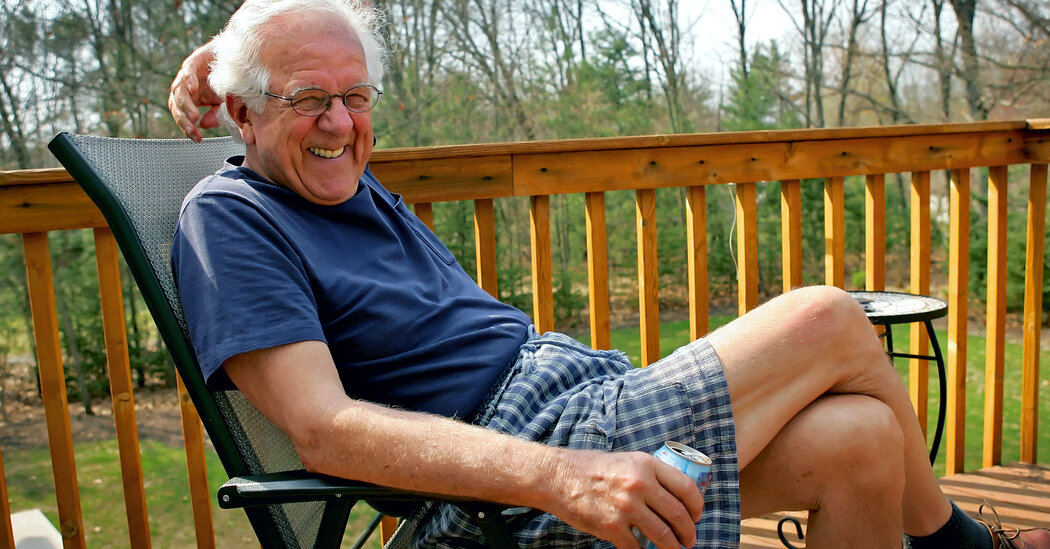William Post, a businessman who was credited with a significant role in inventing Pop-Tarts, a classic American snack and cultural touchstone with an enticing sweetness and simplicity, died on Feb. 10 in Grand Rapids, Mich. He was 96.
His death was confirmed by his son, Dan Post, who said his father had died of heart failure in a senior living community.
Mr. Post led the bakery plant that developed the first Pop-Tarts for Kellogg’s in 1964, his son said. The snack quickly became a popular treat for many people in the United States, including Mr. Post’s children, who were among the first taste testers.
Today, billions of Pop-Tarts are sold each year, according to Kellogg’s. They have also been depicted on murals, showcased in museums and parodied by “Saturday Night Live.” And later this year, they will star in “Unfrosted: The Pop-Tart Story,” a farcical chronicle of the 1960s race to win the breakfast-pastry wars, directed by the comedian (and Pop-Tarts enthusiast) Jerry Seinfeld.
Over the past 60 years, Pop-Tarts have expanded from four flavors to more than 30. But they’ve also maintained the classic form that has made them an American institution: two thin layers of dry, rectangular pastry with a sweet filling and frosting.
William Post was born on June 27, 1927, in Grand Rapids. He was one of seven children born to Henry Post and Johanna Jongsta, Dutch immigrants. His father, who was self-employed, drove a truck that he used to empty the ashes that people would take out of their coal furnaces.
He attended Grand Rapids Christian High School while working part-time at Hekman Biscuit Company washing trucks. A year after his graduation in 1945, he was drafted into the Army Air Corps in occupied Japan.
After completing his military service, he returned to his part-time job, began studying at Calvin College and began a 72-year marriage to Florence Schut, who died in 2020, his son said. Mr. Post left college in 1950 and became a full-time personnel manager at Hekman, which later became part of the Keebler Company.
When Kellogg’s approached Mr. Post in 1964, he was managing Hekman’s plant in Grand Rapids. At the time Kellogg’s competitor, Post, was creating a toaster pastry called “Country Squares,” which was later named “Toast’em Pop Ups.” Executives from Kellogg’s, which sold cereal, asked Mr. Post if his plant would have the capabilities to create a similar product.
“Being the absolutely positive person that he was,” his son Dan recalled, “he said, ‘absolutely, give me two weeks.’”
There were “many naysayers,” and some of his friends said that Pop-Tarts were “not such a good idea,” Mr. Post told WWMT, a television station that serves West Michigan, in 2021. He ignored them, and put together a team to create what Kellogg’s wanted.
During those two weeks, he offered prototypes to his children at various stages of the product’s development, his son said.
“They went from cardboard to a pastry,” he said. “He would bring samples home almost daily and say, ‘Kids, try these,’” he added. “We’d say, ‘This isn’t so great.’ After two weeks, we said, ‘Hey, these are pretty good.’”
After Mr. Post brought the recipe to Kellogg’s, the company sold its first shipment in Cleveland.
Kellogg’s had originally considered calling Pop-Tarts “fruit scones.” But their final name, coined by one of the Kellogg’s executives, William LaMothe, was inspired by the pop culture movement of the day: “Pop Art.”
The earliest Pop-Tarts were not frosted. The icing was added a few years later when Mr. Post came up with the idea, according to his son.
“I said to our superintendent, Hey, why don’t you take some Pop Tarts and run them under that icer?” Mr. Post said in a video posted earlier this year by Kellanova, the corporate name currently used by Kellogg’s. He faced skeptics who believed that the icing would melt in the toaster, but it did not. “The decision to make all four flavors iced took one day,” he said.
As Pop-Tarts became an increasingly important part of his work, Mr. Post moved to Illinois in 1967 to begin working at the corporate offices of Keebler, where he became senior vice president.
He retired at 56, but continued working as a consultant for Kellogg’s until he was 76. He was also involved in his church and served as a board member for schools, churches and a local YMCA.
In addition to his son, Mr. Post is survived by his daughter, Rachel DeYoung, as well as four grandchildren and 10 great-grandchildren.
Kellogg’s history of the Pop-Tart on its website cites Mr. LaMothe, the chairman, for coming up with the idea for a “toaster-ready rectangle” and asking Joe Thompson to create it. It does not mention Mr. Post.
But after Mr. Post’s death, the company said in a statement, “He played an important role in co-creating the iconic Pop-Tarts brand.”
Mr. Post told his Pop-Tarts story to students into his 80s, his son said. He often talked about being the son of immigrants who could barely speak English, and challenged students to do their best and work hard. He would also bring them samples from his unlimited supply of Pop-Tarts.
Every time he went into a classroom, his son recalled, he would tell the students: “‘If you want to be noticed, always do more than is expected.’”
Victor Mather contributed reporting.







